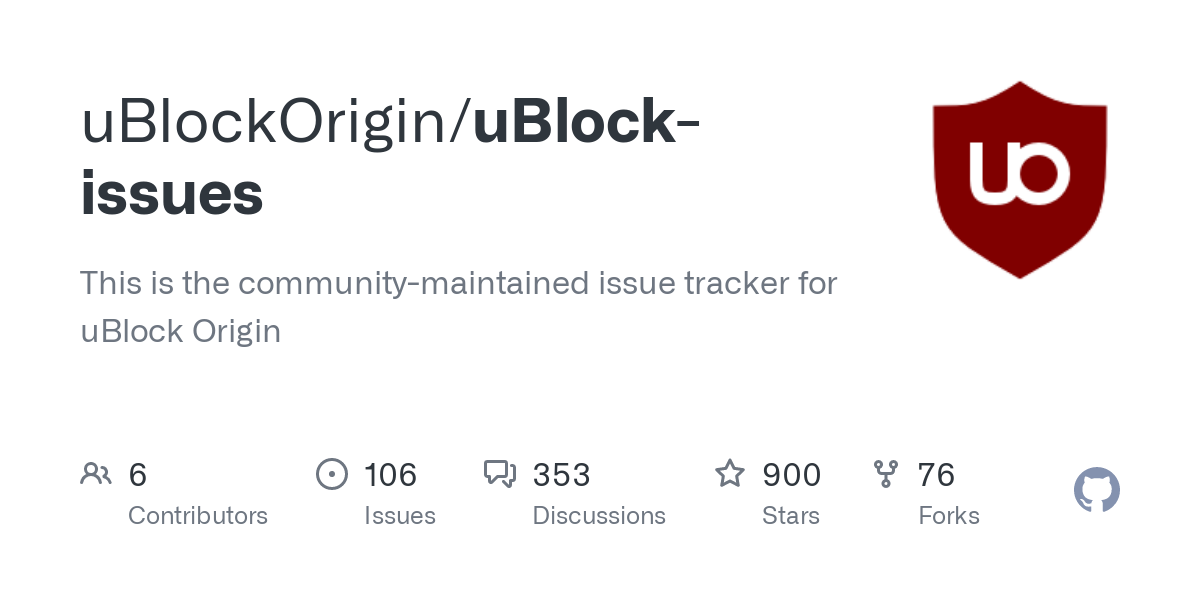EDIT: Apologies. Updated with a link to what gorhill REALLY said:
Manifest v2 uBO will not be automatically replaced by Manifest v3 uBOL[ight]. uBOL is too different from uBO for it to silently replace uBO – you will have to explicitly make a choice as to which extension should replace uBO according to your own prerogatives.
Ultimately whether uBOL is an acceptable alternative to uBO is up to you, it’s not a choice that will be made for you.
Will development of uBO continue? Yes, there are other browsers which are not deprecating Manifest v2, e.g. Firefox.



https://addons.mozilla.org/en-US/firefox/addon/chrome-mask
This addon will work if it’s not letting you
I’ll check it out. Thanks!
Not necessarily. The problem is often that chrome JavaScript implementation can be ever so slightly different from FFs. Or just that the web devs wrote fragile code that is barely working on chrome and doesn’t work on other browsers, where they failed to test.
Worth keeping around at least
Out of principle, I refuse to pretend I am not browsing with Firefox. 🦊❤️✊ Let website statistics show! And I will boycott sites that break due to not testing on multiple browsers!
That works until it’s your bank or credit card website. I cannot use Capital One’s (CC) “pay bill” any longer.
Change banks
Luckily it hasn’t come to that for me yet. But I have reported issues with my bank’s website to them, and it had been fixed.
Adding to this, Firefox’s JavaScript is much more strict than others (which I love). As a web developer I prioritize testing it in Firefox because it’s helped me find bugs other browsers just plow through.
Personally I use Safari daily and the number of websites that are broken due to poor security (but function fine in Chrome) is alarming. Chrome doesn’t even check content type on
<iframe>last time I checked.I tend to agree with you. Normally if something doesn’t work in firefox it makes sense, but less often is that the case in chrome.
I am fascinated by the idea of a web developer choosing to use Safari, honestly, though. Can I ask why? For me, the hesitancy of adopting new web standards, the lack of a real extensions, and lack of support for non-Apple OSes… combined with lots of random bugs that I only ever see so often in Safari, I absolutely loathe that browser. And I feel like being a web developer conditioned me to feel this way. And then there’s the business practice concerns (Apple selectively supporting new web features with the intention of keeping native apps seen as superior, because it makes them money)… but even ignoring this, I’m a Safari-hater through and through. It feels like Internet Explorer 7 vs Firefox to me.
On iOS I have to support a few major versions of Safari back and it’s nightmarish at times. For certain featuresets, you absolutely cannot assume things will probably work like you can with FF/Chromium browsers and it makes me so ragey sometimes. I’ve been spending the last few weeks trying to workaround an issue in various Safari iOS versions, and it’s not the first time I’ve been in this situation.
I’m curious – what versions of Safari are you required to support on the job?
This was my poor attempt to mean “as an end-user.” I just love that it’s tied in to the Apple ecosystem and the UI is so much cleaner than other browsers.
I’ve tried to make the switch to others but they always feel very clunky. I love Firefox to death but it looks awful (at least on macOS). I’m not a big extension guy because I’m filtering DNS and IP traffic at the network layer — if we’re talking about ad blocking, tracking and the like it doesn’t make sense to only protect against it in the browser, as apps tend to send traffic to the very same domains as the websites.
I actually hate the trend of apps being nothing more than a wrapper around web applications. It comes off as lazy development, and I miss native apps (regardless of platform) instead of these creepy wrappers around web applications. So I actually have to agree with Apple there.
As for browser support, my team works on an internal-only app and our security policy doesn’t allow outdated browsers, so there’s no hard rules when it comes to browser support.